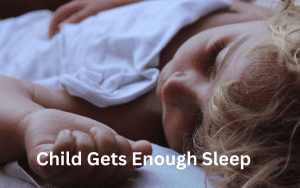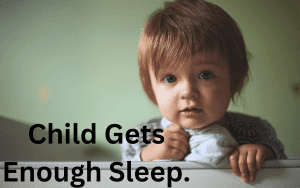Make Sure Your Child Gets Enough Sleep.

Sleep is really important. Children may deny it, but you must ensure that your child gets enough sleep, through which they will perform better and more responsibly when they get the recommended amount of sleep each night.
Despite their importance, these aspects of a healthy, stress-free lifestyle are frequently the first to go as the holidays are celebrated and the last to be restored in the new year.
Effects of Social Media on Teen Mental Health: A Missing Link
Child Gets Enough Sleep.
Children’s sleeping patterns may shift noticeably throughout the summer because of later bedtimes and later morning wake-ups. You should talk to your kids about their sleep habits and make sure they are getting enough rest as the new school year approaches.
Children’s health, development, and success in school, extracurricular activities, and social relationships all depend on enough sleep. Set up your children for a great learning experience this year by establishing healthy sleep habits before the school year begins.
Why is it Important that a Child Gets Enough Sleep?
You should prioritize getting enough sleep for your child. Most children have full schedules. There’s school, taking care of your pets, jogging around with pals, attending sports practice or other activities and doing your homework. Your body requires rest at the end of the day. To prepare your body for the next day, sleep is essential.
Sleep is essential for the health of all living things. Even domesticated animals, like your dog or cat, enjoy a good snooze. Like humans, animals need sleep so that their bodies can recharge.
Top 10 Public Health and Safety Organizations in the United Kingdom
Symptoms of Lack of Sleep in Children
Your kid may need more shut-eye, either at night or during the day. The most typical symptoms include:
- Nights spent sleeping poorly or not at all.
- Your kid has trouble breathing or mouth-breathing at night.
- Heightened levels of displeasure or irritation towards others
- Conflict with fellow students
- Depression and anxiety symptoms
- Frustration with daytime concentration and comprehension
- Persistent headaches, particularly upon waking up
- At rest, respiration is interrupted.
- Nightmares, sleepwalking, and more nightmares
- Problematic behaviour and hyperactivity
- The bed can also be used as a drying station.
- Alterations to your emotional state:
- Daytime weariness or lethargy accompanied by frequent yawning
- Irritable disposition
Psychotic experience: Sleep deprivation-induced psychosis can include altered thinking processes, slurred speech, and hallucinations or delusions.
- Alterations to your way of thinking and acting:
- Having trouble focusing
- Experiencing memory loss
- Coordination and balance issues.
- Increased hunger, particularly for high-calorie meals
It’s important to get an accurate diagnosis for your child because these symptoms may resemble those of other disorders. Sleep disorders that require immediate medical attention will be screened for.
Some Wonderful & Creative Ideas to Support Anxious Kids
Causes/ Why Do Children Not Get Enough Sleep?


Inadequate sleep or sleep deprivation can be brought on by a variety of factors, such as physical conditions, mental health disorders, and bad sleep hygiene (habits). Some medical issues that lead to poor sleep include obstructive sleep apnea, periodic limb movements, excessive movement during sleeping and acid reflux.
- Younger children, especially infants, may wake up several times during the night. The disorder is typically characterized by a baby or toddler who does not sleep through the night despite repeated attempts by their parents to soothe them.
- Nighttime sleep for the kid and their family is typically negatively impacted by these prolonged waking times and sleep interruptions. Night awakenings usually occur because a toddler or newborn has not learnt to “self-soothe” and go back to sleep following normal wakings that often happen during the night.
- Sleep Issues in Children What may seem like a problem to us is a major one when viewed through the eyes of a child.
- Events such as a new sibling, teething, sickness, a change in environment, a change in caretaker, a change in routine, or minor complaints such as allergies, colds, or ear infections can all disrupt your child’s sleep.
- Some kids will have trouble sleeping at some time. Sleep difficulties and other mental and physical health problems are interwoven in a vicious cycle that can be difficult to overcome.
Here are the Five Parenting Styles We’re Embracing in 2023
Reasons why we don’t get enough sleep
Shorter sleep cycles can be the consequence of a variety of different circumstances. Still, it’s crucial to take into account the quality of sleep as well as the quantity since the latter can lead to sleep deprivation. Things that disturb regular sleep cycling keep a person from falling asleep, or wake them up all have a negative impact on the quality of sleep.
- Habits and routines: Bedtime and waketime inconsistencies and deliberate actions that shorten sleep time. Late-night tech use is a growing problem.
- Sleep Conditions: Poor conditions for getting some shut-eye. The quality and regularity of one’s sleep may be drastically altered by external elements, including heat, cold, and noise.
- Work: Sleep deprivation is a potential side effect of shift work, which involves working outside of the typical 5-to-9 evening or in the day for working children. When we work shifts, it disrupts our circadian rhythms, which control our wakefulness, drowsiness, appetite, body temperature, and hormone levels.
- Problems Sleeping: Obstructive People might halt or decrease their breathing during sleep for a variety of reasons, including sleep apnea, nasal obstruction, and snoring. This has the potential to wake someone up or otherwise disrupt their sleep.
Why Children Are Estranged From Parents?
Different illnesses:
- Depression, Concerns relating to the mind (such as panic attacks and depression). Insomnia caused by these conditions is common.
- Nocturia refers to the occurrence of frequent urination in the middle of the night. That can throw off your circadian rhythms.
- Diabetes. Changes in blood sugar might make it difficult to get to sleep.
- Abuse of drugs. Medication, liquor, drugs, and dependency.
Other Major Reasons
Insomnia
The inability to fall asleep or the persistence of sleep disruptions throughout the night are the hallmarks of insomnia. One symptom might be an inability to fall asleep or to feel rested after sleeping. Insomnia is not age-specific.
Insomnia can be caused by a number of causes, including mental health disorders (such as sadness and anxiety), environmental variables (such as noise or light), lifestyle factors (such as irregular sleeping hours or poor sleep hygiene), or even just an “overactive mind.”
Creatures of the Night and Nightmares


Young children may have difficulty recognizing the difference between reality and a nightmare. Nightmares are common causes of waking in children and typically occur during rapid eye movement sleep. In such a case, it’s best to reassure them and help them fall back to sleep.
One-third of children have night terrors, also known as sleep terrors, which are parasomnias that occur in the early hours of the night during non-REM sleep.
Your child may scream and bolt upright during a night terror, but they won’t generally wake up or recall the occurrence in the morning. The most important thing is to keep your kid safe, which means keeping them in bed as much as possible.
If your child has a night terror now and then, you shouldn’t wake them up or worry about it, but if they happen frequently or are causing them to be sleepy during the day, you should talk to their paediatrician about it.
BREAK FOR PARENTS TO SPEND TIME WITH THEIR KIDS.
Walking and Talking in Your Sleep
Vocalizations in sleep, or “sleep talking,” is a common kind of parasomnia. Light sleep is when sleep talking is most likely to occur; therefore, improving your sleep hygiene might help lessen incidents.
Sleep talking is harmless in and of itself, but it may wake up your partner or other bedroom occupants. It can be related to different types of disturbed sleep, including night terrors or sleepwalking.
One study found that 30% of children experience sleepwalking before the age of 13, with the majority of cases happening in pre-adolescence. Sleepwalkers, like those who talk in their sleep, typically are unaware of their surroundings and do not remember engaging in the behaviour in question.
In addition to causing daytime tiredness, the effects of sleepwalking can be severe. If your child sleepwalks, it’s a good idea to safety-proof their bedroom and add an alarm. It has been shown to be effective in waking a person up 30 minutes before their typical sleepwalking episode.
A Sleep Apnea and Snoring Study
Snoring occurs infrequently in children, just like it does in adults. Inflammation of the tonsils and adenoids, allergies, excess body fat, exposure to secondhand smoke, and other factors can all contribute to a child’s snoring. However, sleep apnea might be the cause of your child’s severe snoring or breathing pauses followed by gasps.
Sleep apnea poses a challenge to children as it results in recurrent awakenings during nighttime, stemming from breathing difficulties. Signs of sleep deprivation, such as drowsiness throughout the day, inattention, and hyperactivity, maybe the first indication that anything is wrong with your child.
Your child’s health might suffer from chronic snoring or sleep apnea, and it can be disruptive to the rest of the family. Consult your child’s doctor about treatment options.
Syndrome of the Restless Legs
Restless legs syndrome in children is characterized by an overwhelming need to move their legs. It might be hard to pin down. You may chalk it up to growth pains or a case of the wiggles.
Encouraging your child to practice good sleep hygiene and pre-sleep stretching can help ease their nocturnal restless leg syndrome. Supplemental iron has been shown to be effective in treating adults, but its usage in paediatrics is currently being studied.
When Kids Don’t Get Enough Sleep, Consequences


Every parent knows that a child who doesn’t get enough sleep might appear irritable one minute and too energetic the next, displaying symptoms similar to those of ADHD.
Your child’s academic performance may suffer if they are unable to focus because of sleepiness. Your child’s day-to-day functioning may be negatively impacted by even a slight reduction in sleep.
New research suggests that poor sleep quality in infancy is associated with increased risks of cardiovascular disease in the form of overweight and diabetes in adulthood.
Consequences of Insufficient Sleep
Lack of sleep may have serious consequences for your health. The immune system, brain, hormones, metabolism, blood pressure, and heart all benefit from a good night’s sleep.
Effects on the Mind
Lack of sleep can impair cognitive processes such as memory, mood and attention regulation, information processing speed, and the development of insight. These impairments can occur even after a brief period of sleep deprivation.
In particular, sleep is critically important for the development and consolidation of memories.
The brain accumulates waste products during the day, and sleep is essential for removing them. Accumulation of these harmful proteins is implicated in the development of Alzheimer’s Disease.
- Lack of sleep raises the probability of developing dementia and other mental declines.
- It’s worth noting that sleep deprivation frequently accompanies two common mental health conditions, namely depression and anxiety.
- These are issues that require attention and support to manage effectively.
- Getting enough shut-eye might help you keep your feelings in check.
- Lack of sleep appears to contribute to mental health problems in both directions.
- Mental health issues can cause sleep problems.? On the flip side, better sleep can help prevent or reduce mental health problems. Let’s prioritize our sleep and mental well-being!
Children’s sleep is very important for their mental growth. Studies have shown that sleep influences not just one’s level of pleasure but also one’s level of alertness and attention, cognitive function, mood, resilience, language acquisition, learning, and memory.
Chronic Disease Danger
Adequate sleep is necessary for healthy blood sugar. Cholesterol and blood pressure levels. Sleep has been shown to affect both dietary habits and physical activity levels.
For energy, our systems may yearn for fatty and carbohydrate-rich meals when we don’t get enough sleep. We also experience exhaustion and drowsiness during the day, which might limit our drive to exercise and hamper our performance when we do exercise.
Obesity, hypercholesterolemia (high cholesterol levels), diabetes, and hypertension are among cardiometabolic diseases that have been linked to insufficient sleep. Reduced risk of cardiovascular disease mortality and morbidity is connected with shorter sleep lengths, especially fewer than 7 hours each night.
Effects on Immunological Function


The immune system and sleep have several intimate connections. There is a rise in cytokines and other proteins vital to immune response and inflammation during sleep.
Wound healing and infection prevention are likely aided by the immune system’s modulation during sleep. Maintaining a healthy immune defence system requires a consistent sleep schedule, which can boost the immunological response.
That’s why getting enough shut-eye can help you respond better to immunizations and experience fewer severe allergic responses.
Negative effects on the immune system from chronic sleep loss include increased susceptibility to infection and a diminished response to immunization. Lack of sleep leads to health problems such as inflammation and a weakened immune system.
Suggestions to Help Your Kid Get a Good Night’s Rest
1. Sleep Hygiene For Kids
The concept of “sleep hygiene,” or a set of practices that encourage restful sleep, is especially important for kids. Poor sleep hygiene contributes to or exacerbates many sleep problems.
Consistency is the name of the game when it comes to practising good sleep hygiene. It takes time and practice for sleep methods to bear fruit.
Humans are creatures of habit. Therefore, it’s best to create one.
A, Maintaining a regular nighttime routine,
Signals to your child’s brain and body that it’s time to wind down for the night. Your child’s routine may be as unique as he or she is. Still, it should take around 20 minutes and include three or four calm activities like:
Getting into pyjamas, brushing your teeth, taking a warm bath, and reading. In contrast to the unpredictability of sleeplessness, children’s bedtime rituals give a feeling of familiarity and calm.
B. Establish a regular bedtime routine
A bedtime routine helps your child sleep by synchronizing with his or her internal clock. Consistency is key when it comes to bedtimes, so it’s best to stick to the same one on weekends as you do on weekdays. If bedtimes are changed on the weekend, it will be more challenging for youngsters to stick to their regular weekday routines.
C, Because screens are so pervasive,
Enforcing a curfew might be challenging, but the results are worth it. Blue light from electronics like smartphones, TVs, and tablets has been shown to reduce levels of the sleep-inducing hormone melatonin. In some cases, children may be especially susceptible.
D, Impact of screen light on human eyes.
The use of electronic screens prior to bedtime may impede the process of winding down for the night. To improve sleep hygiene, it is recommended that electronic devices be kept out of the bedroom and that their use be avoided in the hour leading up to bedtime.
This measure is particularly important as it has been shown that electronic screens emit blue light that interferes with the natural production of melatonin.
This hormone helps regulate sleep-wake cycles. By practising this habit, individuals can experience improved quality of sleep and enhanced overall well-being. The family media package is an option to consider.
E, Exercise
Studies have indicated that consistent physical activity can contribute to improved sleep quality, both in terms of initiating and maintaining sleep, regardless of one’s age. In general, kids need at least an hour on a daily basis.
Just do everything manageable in the two hours before bed. If your child is overstimulated, he or she may have trouble relaxing and falling asleep.
F, Avoid scary or violent content:
Young children sometimes have trouble sleeping because they are overly anxious or terrified. It’s hardly surprising that exposure to scary or violent media in the evening, whether it be film, television, video games, or even literature, is associated with sleep disruptions.
In young people. If your youngster enjoys the gruesome or terrifying things, keep it for the daylight.
G, Eliminate caffeine:
It’s a given. In addition to making it more difficult to fall asleep, caffeine also diminishes the quality of sleep. Tea, decaf coffee (which still provides tiny quantities of caffeine), and chocolate are sneakier sources of caffeine than soda, coffee, and energy drinks. Caffeine, even in small doses, may have a significant effect.
In a little frame. Caffeine should not be given to a youngster within six hours of bedtime.
H, Don’t sleep with a pet.
Although it may be tempting for kids to cuddle up with Fido in bed, having a pet in the room at night might disrupt a child’s sleep due to the animal’s sounds and movements. Try letting your animal family member sleep outside of your child’s bedroom for a few nights to see if it helps. Incorporating the act of bidding farewell to our pets as an integral part of our evening routine can facilitate their adaptation and well-being.
2. Preparing a Calm Bedchamber


You can help your kid fall asleep faster and stay asleep longer by making their bedroom as comfortable as possible. Discomfort in the bedroom is a known aggravator of insomnia.
Sleep is even more elusive. Make sure your baby has a safe and comfortable place to rest by following these guidelines.
- Room Temperature: When exposed to ambient temperature, both the body and the mind relax. In order to get to sleep, a stuffy bedroom might prevent this. Keep the temperature at roughly 65 degrees to avoid this.
- Noise: Studies have shown that even low levels of ambient sound can negatively impact sleep, regardless of whether or not the sleeper wakes up. Put up some thick drapes to drown out the sounds of the street. One may also employ a fan or a white noise machine to obscure any undesirable sounds. It’s important to ensure that the device is positioned appropriately to effectively mask the noise.
- Light Level: Dim the lights in the house and make sure your kid’s room is completely dark before bedtime. The result is an increase in melatonin production. …and helps your child’s internal clock. A little nightlight is OK if your youngster is terrified of the dark.
- Fragrances that are calm, like lavender, somewhat sedative in nature. Try using essential oils, a room diffuser, or a dried potpourri sachet to give a peaceful, sleep-inducing fragrance.
Five Bedtime Routines; That Parents Will Love As Much As Their Children
3, Conquering Nighttime Anxiety
Insomnia is commonly associated with stress at any age. Therefore, techniques that may alleviate anxiety just before bed are welcome. Use these strategies to teach your child how to cope with worry:
- Write In a Journal: Get Your Youngster to Write in a Journal Suggest that your youngster write down their worries to help them feel better. They may also find it beneficial to reflect on the positive aspects of their day and put those thoughts on paper. Children will feel safer if they are encouraged to look on the bright side.
- Mindfulness Exercises: Meditation and other forms of mindfulness training have been shown to reduce stress hormones and promote overall nervous system calm. Parents and children can perform meditation together in a variety of ways. Common examples include deep breathing exercises, focusing on one’s body, and the use of guided imagery. For inspiration, check out books, recordings and even apps for your smartphone.
- Make a Worry Time: Talking about concerns is healthy, but not just before bed. Make time each day for your kids to talk about how they’re feeling and what they can do about it. This can help keep kids from stressing out right before bed.
4. Mastering the Room Check
Even the soundest sleepers occasionally wake up and call for Mum or Dad. It’s OK to respond to a child’s needs when they are expressed through crying. However, your actions should be deliberate.
If you give in to their demands now, they will be more stimulated, and you will have a harder time sleeping later. Fulfilling your child’s every request might also foster an unhealthy practice of relying on parental aid for sleep.
Keep the length and complexity of the checks to a minimum. The goal is to help your child feel secure and loved while encouraging him or her to learn to go to sleep without assistance. Some guardians may even delay answering the phone for a few seconds if it means their child can go back to sleep without them.
Visit blogkingworld.com for further parental excited articles.




